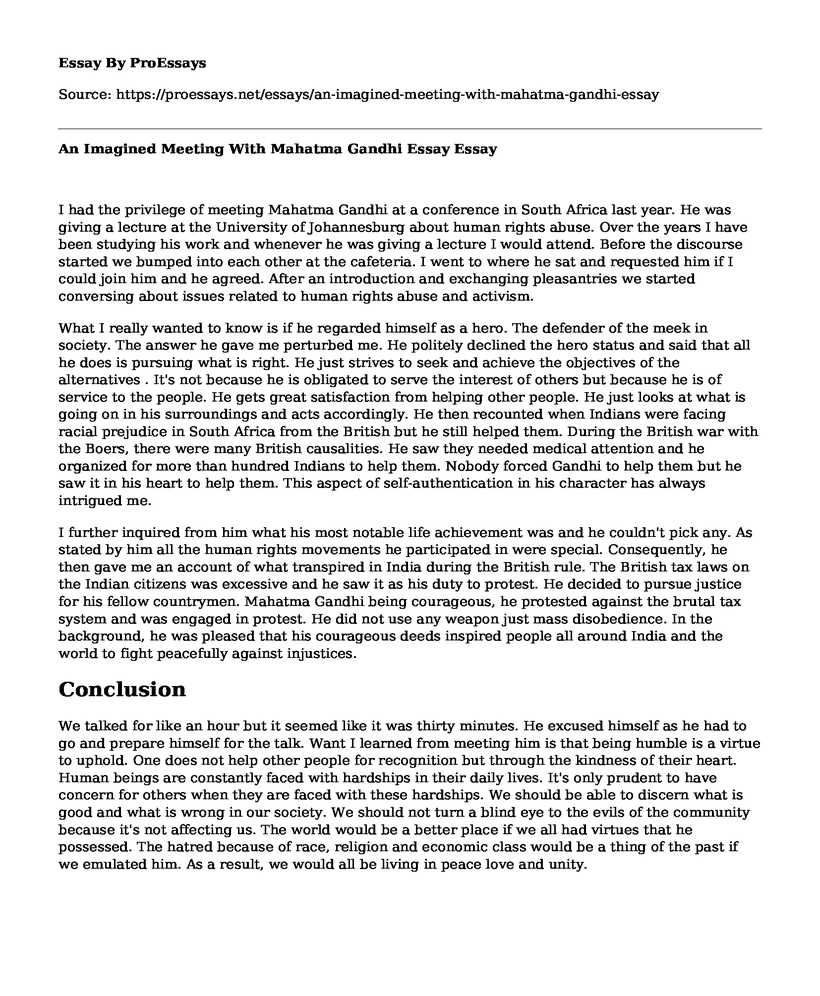I had the privilege of meeting Mahatma Gandhi at a conference in South Africa last year. He was giving a lecture at the University of Johannesburg about human rights abuse. Over the years I have been studying his work and whenever he was giving a lecture I would attend. Before the discourse started we bumped into each other at the cafeteria. I went to where he sat and requested him if I could join him and he agreed. After an introduction and exchanging pleasantries we started conversing about issues related to human rights abuse and activism.
What I really wanted to know is if he regarded himself as a hero. The defender of the meek in society. The answer he gave me perturbed me. He politely declined the hero status and said that all he does is pursuing what is right. He just strives to seek and achieve the objectives of the alternatives . It's not because he is obligated to serve the interest of others but because he is of service to the people. He gets great satisfaction from helping other people. He just looks at what is going on in his surroundings and acts accordingly. He then recounted when Indians were facing racial prejudice in South Africa from the British but he still helped them. During the British war with the Boers, there were many British causalities. He saw they needed medical attention and he organized for more than hundred Indians to help them. Nobody forced Gandhi to help them but he saw it in his heart to help them. This aspect of self-authentication in his character has always intrigued me.
I further inquired from him what his most notable life achievement was and he couldn't pick any. As stated by him all the human rights movements he participated in were special. Consequently, he then gave me an account of what transpired in India during the British rule. The British tax laws on the Indian citizens was excessive and he saw it as his duty to protest. He decided to pursue justice for his fellow countrymen. Mahatma Gandhi being courageous, he protested against the brutal tax system and was engaged in protest. He did not use any weapon just mass disobedience. In the background, he was pleased that his courageous deeds inspired people all around India and the world to fight peacefully against injustices.
Conclusion
We talked for like an hour but it seemed like it was thirty minutes. He excused himself as he had to go and prepare himself for the talk. Want I learned from meeting him is that being humble is a virtue to uphold. One does not help other people for recognition but through the kindness of their heart. Human beings are constantly faced with hardships in their daily lives. It's only prudent to have concern for others when they are faced with these hardships. We should be able to discern what is good and what is wrong in our society. We should not turn a blind eye to the evils of the community because it's not affecting us. The world would be a better place if we all had virtues that he possessed. The hatred because of race, religion and economic class would be a thing of the past if we emulated him. As a result, we would all be living in peace love and unity.
Cite this page
An Imagined Meeting With Mahatma Gandhi Essay. (2022, May 17). Retrieved from https://proessays.net/essays/an-imagined-meeting-with-mahatma-gandhi-essay
If you are the original author of this essay and no longer wish to have it published on the ProEssays website, please click below to request its removal:
- Essay Example on The Presence of Ancient Aliens
- Hiroshima Book Review
- Presidential Power Essay
- Essay Sample on Statesmanship and Civic Administration: A Political Leader's Duty
- European Imperialism: The Native African American Experience - Essay Sample
- Essay Sample on Heathcliff's Struggles: Wuthering Heights Shows Race, Class Impact of Industrial Revolution
- Essay Example on Simone de Beauvoir: Leading Existentialist Theorist & Feminist







